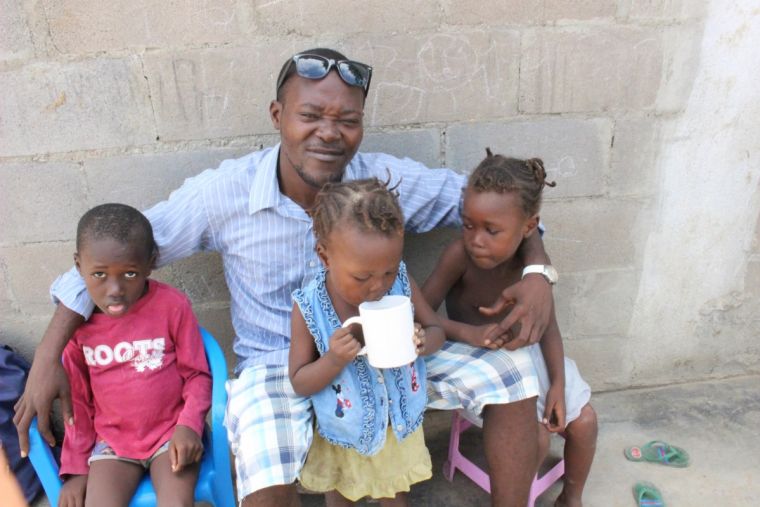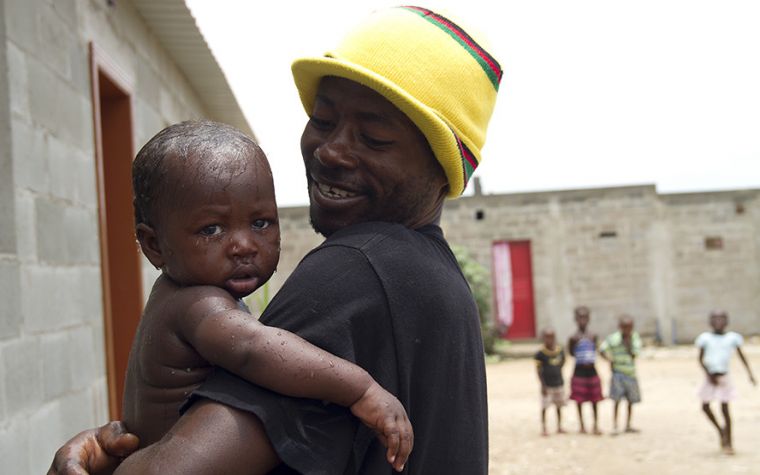Fatherhood among Angola's fatherless generation

"A good father should fight for his children," says Rafael Cassinda. "He should make sure they have what they need."
Rafael, 35, has five children to fight for. And it has been a struggle. Rafael lives in the coastal city of Lobito, in Angola. His own father died when he was five, and by the age of 10 Rafael was living on the streets.
He slept under cardboard boxes beneath buildings, and washed in the sea. Money for food came from cleaning cars. With scant shelter, his nights were spent at the mercy of the elements. "When it rained, it was tricky," he says, with simple understatement.
Downpours were not the only danger lurking in the dark. "It was never safe," Rafael explains. "The police were always after us, wanting to hurt us. It was really very hard."
Rafael was one of many. The Angolan government estimates that 700,000 children lost one or both parents during the country's 27-year civil war. A further 100,000 were separated from their families.
In Angola, as in many places, street children are often treated as little more than vermin by the authorities, who associate them with crime, prostitution, alcoholism and drugs. Alongside the rain, many street children count the police among their biggest fears.
The war finally ended in 2002, and Angola's children of conflict have grown up. Many, like Rafael, are now parents themselves, seeking to give their children the chances they never had. But when babies are born into homelessness, their future looks bleak.
When Rafael's first child arrived, he and his wife were living in a makeshift cardboard shelter in Lobito. His joy at becoming a dad was blighted by the challenges of caring for a newborn with no roof over their heads.
"The difficult thing was when the rain beat down on our boxes. When you've got a baby less than a year old, that's hard."
Now, after more than 20 years living rough, Rafael and his family no longer need to fear the rain. They finally have a home of their own, complete with a bathroom and electricity.
Rafael's family live in a breezeblock home in '16 June', a unique community for former street children, and the first of its kind in Angola. The local government built Rafael's house, along with over 80 others, after years of campaigning by Angolan children's rights group Omunga, supported by Christian Aid. Over time, Omunga trained up the young people to take the lead in lobbying for their homes, supporting them along a gradual journey from homeless outsiders to active citizens.
"We had to fight to get these houses built, it was a real struggle," explains Evaristo Tchilala, another 16 June resident. "Omunga has been like a father to us. They opened our eyes."

Like Rafael, Evaristo spent most of his youth living rough. His father, a soldier during the war, disappeared one morning in 1992; Evaristo never saw him again. He didn't get on with his stepfather and left home at 12.
Life on the streets was tough: Evaristo would knock on doors to beg for scraps of food from people's bins. His experiences left him determined to have no children unless he could offer them a safe home.
"It was very difficult. We lived very badly. We were humiliated, we were tortured, we were ignored. Many things happened to us. We used to sniff petrol to bear the cold of the night, otherwise it was unbearable... I would never let a child of mine suffer what I suffered."
Since moving into their own house in 16 June, Evaristo and his wife Natalia have had four children. Their eldest, five-year-old Emilio, recently started school, and helping him get ready each morning is one of Evaristo's greatest joys: "It's something I never got to do myself."
Both Rafael and Evaristo place a high value on their children's education. Neither can read or write well, but both are determined that their children will. "I want them to learn to study so that they can have the future they want," explains Rafael.
One key step to securing this future is to make sure that the children officially exist.
Unless they have identity documents, children are not recognised as Angolan citizens. This means they can't, for example, enrol in school or vaccination programmes, while adults can't get a formal job. With limited schooling, many 16 June residents struggle to manage official paperwork, so Omunga has been on hand to guide them through the process of registering themselves and their children.
Rafael's five children all now have identity papers. "It's important because if they don't have them it will be difficult for them when they grow up. They need them to work and to study."
Evaristo agrees: "A child needs them so they can be part of society. My hopes for my children are that they become people who contribute to society, to help Angola grow."
From someone who spent so many years surviving on the margins of that society, bearing the weight of its indifference, Evaristo's aspirations are both generous and poignant. He simply asks that his children should not be denied their chance to contribute.
Omunga's work is supported by Christian Aid and Irish Aid.











